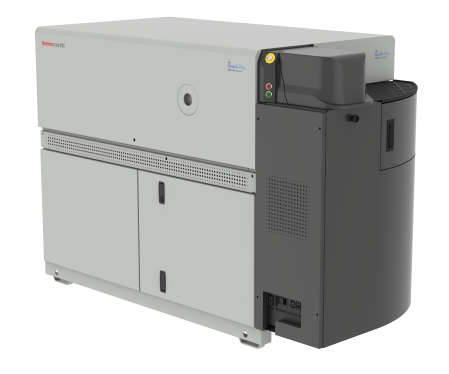Thermo Fisher has announced the release of its new Thermo Scientific™ ARL iSpark™ Plus Optical Emission Spectrometer range, designed to streamline elemental analysis in the metal production, processing and recycling industries, as well as in contract and research labs.

Image Credit: Thermo Fisher Scientific
Overview
The new line of ARL iSpark Plus Optical Emission Spectrometers offers metal producers, processors and recyclers – as well as contract and research labs – the rapid and reliable spectral analysis needed to achieve key productivity, quality and environmental objectives.
The new instruments build on the legacy of Thermo Fisher’s flagship ARL iSpark range, combining state-of-the-art technologies, user-friendly features and advanced automation algorithms to enable the wide-range spectral analysis of metal samples and ultra-fast detection of non-metallic inclusions. The ARL iSpark Plus line adds a new and improved spark stand to extend maintenance intervals by 30 %, minimize signal drift for most elements and ensure virtually no memory effect from preceding samples. With seamless software and firmware interaction also cutting down on processing time by 15 %, these are Thermo Fisher’s most advanced optical emission spectrometers yet.
Ryan Lydon, Senior Director and General Manager of Metals and Minerals at Thermo Fisher, commented: “As an industry-leading instrument supplier, we are always conscious of the industrial challenges faced by our customers, which is why we are continuously improving and updating our product portfolio to provide the best tools possible. The increased analytical speed and stability of the new ARL iSpark Plus spectrometers illustrate this ethos perfectly, allowing steel plants and foundries to minimize tap to tap times, save energy, reduce carbon footprints and realize a faster return on investment."
Key Applications
Streamlined elemental analysis for the metal production, processing and recycling industries.
Features/Benefits
- Unique high sensitivity photomultiplier tube optics
- Digital spark generation
- Single spark acquisition
- Smart argon management
- Advanced data collection technologies
- Intelligent processing algorithms
- Ultra-fast analysis of non-metallic inclusions
- 15 % faster processing times
- 30 % longer maintenance intervals
- Minimal signal drift
- Virtually no memory effect